546
By Tracy Moses
Former Minister of Transportation and ex- Governor of Rivers State, Rotimi Amaechi, has called on Nigerians to demand stronger accountability from their leaders and confront the systemic failures threatening the country’s development and cohesion.
Amaechi made the call at the unveiling of the 2025 Nigeria Social Cohesion Survey Report during the National Social Cohesion Dialogue held in Abuja on Thursday. The event, convened under the theme “Rebuilding Citizens’ Trust and Public Confidence in Government and Public Institutions,” attracted stakeholders from civil society, academia, the media, and the political class.
With Nigeria battling deepening economic woes and worsening insecurity, Amaechi painted a grim picture of a country at the brink.
“With over 200 million citizens and just 500,000 security personnel, the rising incidents of robbery and kidnapping suggest a system that is clearly failing,” he warned.
He decried the widening gulf between Nigeria’s ruling class and its impoverished citizens, criticizing the extravagance of public officials.
“In the past, even the corrupt tried to be discreet. Now, it’s all about bulletproof Mercedes Benzes while ordinary Nigerians languish in poverty. This growing indifference is dangerous,” he cautioned.
Amaechi underscored the role of regular wage payments in driving local economies. “When workers get paid, they spend on essentials, tailors, mechanics, doctors. That’s how the grassroots economy survives,” he noted.
Presenting the key findings of the report, Executive Director of the Africa Polling Institute (API), Prof. Bell Ihua, said trust in government institutions had dropped to record lows. The survey showed that most Nigerians now trust traditional and religious institutions more than elected officials or public agencies.
“Justice is increasingly seen as the privilege of the rich and powerful. Many feel voiceless and sidelined from the governance process,” Ihua observed.
He advocated for urgent, data-driven policy interventions, nationwide civic education, and the construction of a new, inclusive national identity that transcends ethnic and religious divisions.
Panelists at the dialogue traced the nation’s fractured social fabric to a lack of shared values and ideological vision. One speaker drew inspiration from India’s Swachh Bharat (Clean India) campaign, suggesting a similar national movement that could serve as a unifying symbol for Nigerians.
“We need a common vision that transcends ethnicity and religion, something symbolic that brings us together,” the speaker said.
Moderating the session, broadcast journalist Nancy Illoh-Nanji referenced former Kaduna Governor Nasir El-Rufai’s remark that Nigeria’s future lies in the hands of its elite, before posing a piercing question: “But what happens when dysfunction becomes the new normal among them?”
Mr. Nwachukwu, Acting General Manager of Democracy Radio, stressed that any effort at reform must prioritize the inclusion of youth and women.
“A nation cannot be built without young people, and it certainly cannot be sustained without women. Any reform that leaves them out is bound to fail,” he stated.
Also contributing, Adewale Ajadi, Chairman of Ethnocopia and a communications consultant at Thinker, emphasized the importance of grassroots solutions in promoting unity.
“In many communities, one household powers 20 air conditioners while the next has no electricity. We must organize around the resources we already have,” he said, referencing Rwanda’s local development model.
Quoting the Yoruba proverb molu, “use it well or lose it”, Ajadi urged citizens to move beyond despair and embrace practical, community-led solutions.
Jamila Mohammed Dahiru, Lecturer and Founder of We Are Center for Community Awareness and Empowerment Initiative, highlighted Kaduna State’s successful implementation of the Open Government Partnership (OGP) under El-Rufai, where participatory budgeting and citizen oversight fostered public trust.
“Civil society had a seat at the table. People felt seen and heard, and that made a real difference,” she said.
Dahiru also expressed concern over the removal of history and civic education from Nigeria’s school curriculum, warning that the younger generation is growing up without a sense of national identity or historical grounding.
Uche Igwe, a Research Fellow at the London School of Economics’ Firoz Lalji Institute for Africa, warned against the harmful effects of ethnic profiling.
“Assuming that all Igbos behave a certain way or all Hausas think alike is not just false, it’s dangerous. These stereotypes erode national unity,” he said.
Enene Ejembi, Executive Director of Verbatim Virtual Solutions, linked growing poverty to rising disunity, noting that hunger often pushes people toward divisive leaders.
“When people are hungry, they’ll follow anyone who offers food, even if that person is tearing the country apart. Hunger destroys ideology. Without economic freedom, people can’t fight for shared values,” she said.
From ‘I’ to ‘We’: A Call for Collective Purpose
In his closing remarks, Mohammed Adogi Mutala, Founder and Executive Director of System, Strategy and Policy Lab, emphasized the need to forge a collective national identity.
“Nigeria’s problems won’t be solved by elites alone. We must move from ‘I’ to ‘We’. Citizens must reclaim ownership of the national agenda,” he asserted.
Way Forward
The 2025 Nigeria Social Cohesion Survey Report offers a sobering diagnosis of the country’s pressing challenges, rising inequality, declining trust, and deepening social divides. Yet, speakers at the dialogue agreed that the current crisis offers a pivotal opportunity: to rebuild the nation on the pillars of shared values, inclusive governance, and empowered local communities.



